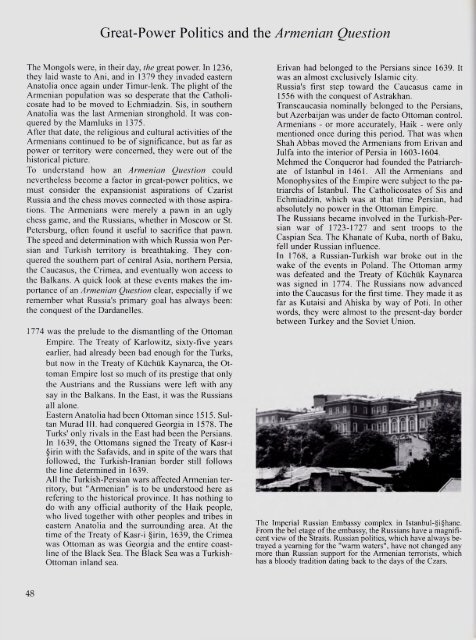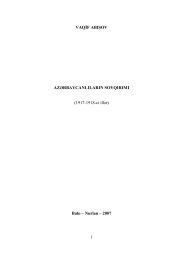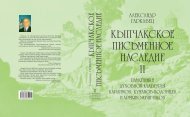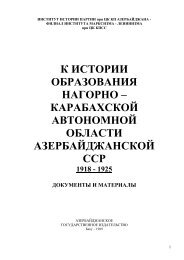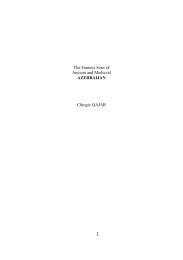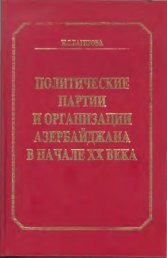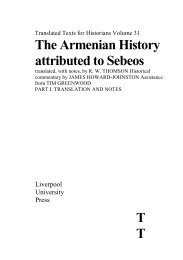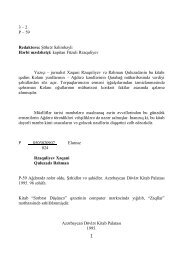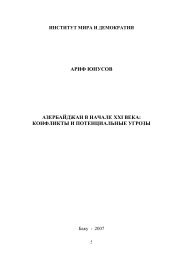ARMENIAN - Erevangala500
ARMENIAN - Erevangala500
ARMENIAN - Erevangala500
Create successful ePaper yourself
Turn your PDF publications into a flip-book with our unique Google optimized e-Paper software.
Great-Power Politics and the Armenian Question<br />
The Mongols were, in their day, the great power. In 1236,<br />
they laid waste to Ani, and in 1379 they invaded eastern<br />
Anatolia once again under Timur-lenk. The plight of the<br />
Armenian population was so desperate that the Catholi-<br />
cosate had to be moved to Echmiadzin. Sis, in southern<br />
Anatolia was the last Armenian stronghold. It was conquered<br />
by the Mamluks in 1375.<br />
After that date, the religious and cultural activities of the<br />
Armenians continued to be of significance, but as far as<br />
power or territory were concerned, they were out of the<br />
historical picture.<br />
To understand how an Armenian Question could<br />
nevertheless become a factor in great-power politics, we<br />
must consider the expansionist aspirations of Czarist<br />
Russia and the chess moves connected with those aspirations.<br />
The Armenians were merely a pawn in an ugly<br />
chess game, and the Russians, whether in Moscow or St.<br />
Petersburg, often found it useful to sacrifice that pawn.<br />
The speed and determination with which Russia won Persian<br />
and Turkish territory is breathtaking. They conquered<br />
the southern part o f central Asia, northern Persia,<br />
the Caucasus, the Crimea, and eventually won access to<br />
the Balkans. A quick look at these events makes the importance<br />
of an Armenian Question clear, especially if we<br />
remember what Russia's primary goal has always been:<br />
the conquest of the Dardanelles.<br />
1774 was the prelude to the dismantling of the Ottoman<br />
Empire. The Treaty of Karlowitz, sixty-five years<br />
earlier, had already been bad enough for the Turks,<br />
but now in the Treaty of Kiichiik Kaynarca, the Ottoman<br />
Empire lost so much of its prestige that only<br />
the Austrians and the Russians were left with any<br />
say in the Balkans. In the East, it was the Russians<br />
all alone.<br />
Eastern Anatolia had been Ottoman since 1515. Sultan<br />
Murad III. had conquered Georgia in 1578. The<br />
Turks' only rivals in the East had been the Persians.<br />
In 1639, the Ottomans signed the Treaty o f Kasr-i<br />
§irin with the Safavids, and in spite o f the wars that<br />
followed, the Turkish-Iranian border still follows<br />
the line determined in 1639.<br />
All the Turkish-Persian wars affected Armenian territory,<br />
but "Armenian" is to be understood here as<br />
refering to the historical province. It has nothing to<br />
do with any official authority of the Haik people,<br />
who lived together with other peoples and tribes in<br />
eastern Anatolia and the surrounding area. At the<br />
time o f the Treaty of Kasr-i §irin, 1639, the Crimea<br />
was Ottoman as was Georgia and the entire coastline<br />
of the Black Sea. The Black Sea was a Turkish-<br />
Ottoman inland sea.<br />
48<br />
Erivan had belonged to the Persians since 1639. It<br />
was an almost exclusively Islamic city.<br />
Russia's first step toward the Caucasus came in<br />
1556 with the conquest of Astrakhan.<br />
Transcaucasia nominally belonged to the Persians,<br />
but Azerbaijan was under de facto Ottoman control.<br />
Armenians - or more accurately, Haik - were only<br />
mentioned once during this period. That was when<br />
Shah Abbas moved the Armenians from Erivan and<br />
Julfa into the interior of Persia in 1603-1604.<br />
Mehmed the Conqueror had founded the Patriarchate<br />
of Istanbul in 1461. All the Armenians and<br />
Monophysites of the Empire were subject to the patriarchs<br />
of Istanbul. The Catholicosates o f Sis and<br />
Echmiadzin, which was at that time Persian, had<br />
absolutely no power in the Ottoman Empire.<br />
The Russians became involved in the Turkish-Per-<br />
sian war of 1723-1727 and sent troops to the<br />
Caspian Sea. The Khanate of Kuba, north of Baku,<br />
fell under Russian influence.<br />
In 1768, a Russian-Turkish war broke out in the<br />
wake of the events in Poland. The Ottoman army<br />
was defeated and the Treaty of Kiichiik Kaynarca<br />
was signed in 1774. The Russians now advanced<br />
into the Caucasus for the first time. They made it as<br />
far as Kutaisi and Ahiska by way of Poti. In other<br />
words, they were almost to the present-day border<br />
between Turkey and the Soviet Union.<br />
The Imperial Russian Embassy complex in Istanbul-§i§hane.<br />
From the bel etage of the embassy, the Russians have a magnificent<br />
view of the Straits. Russian politics, which have always betrayed<br />
a yearning for the "warm waters", have not changed any<br />
more than Russian support for the Armenian terrorists, which<br />
has a bloody tradition dating back to the days of the Czars.


